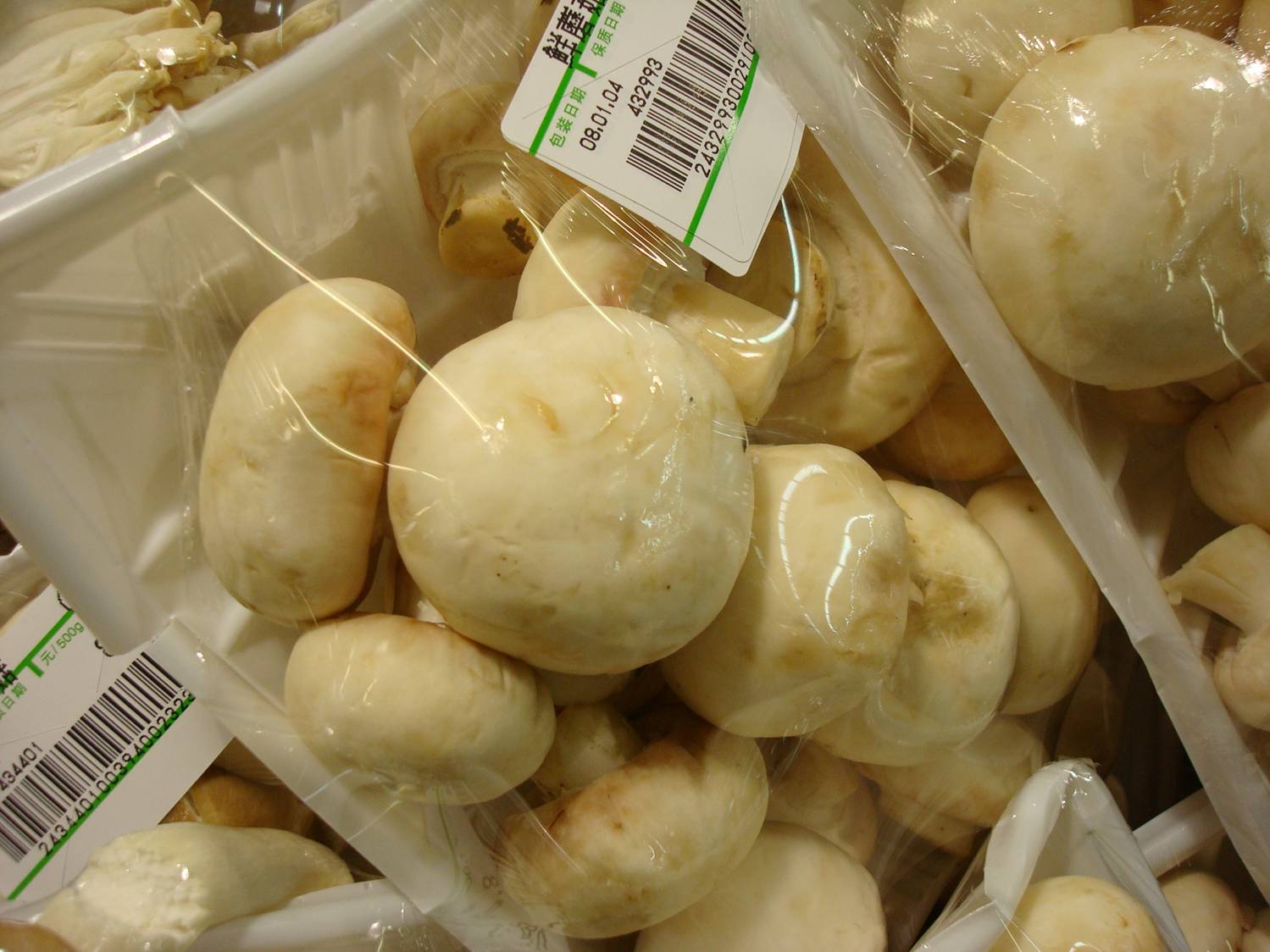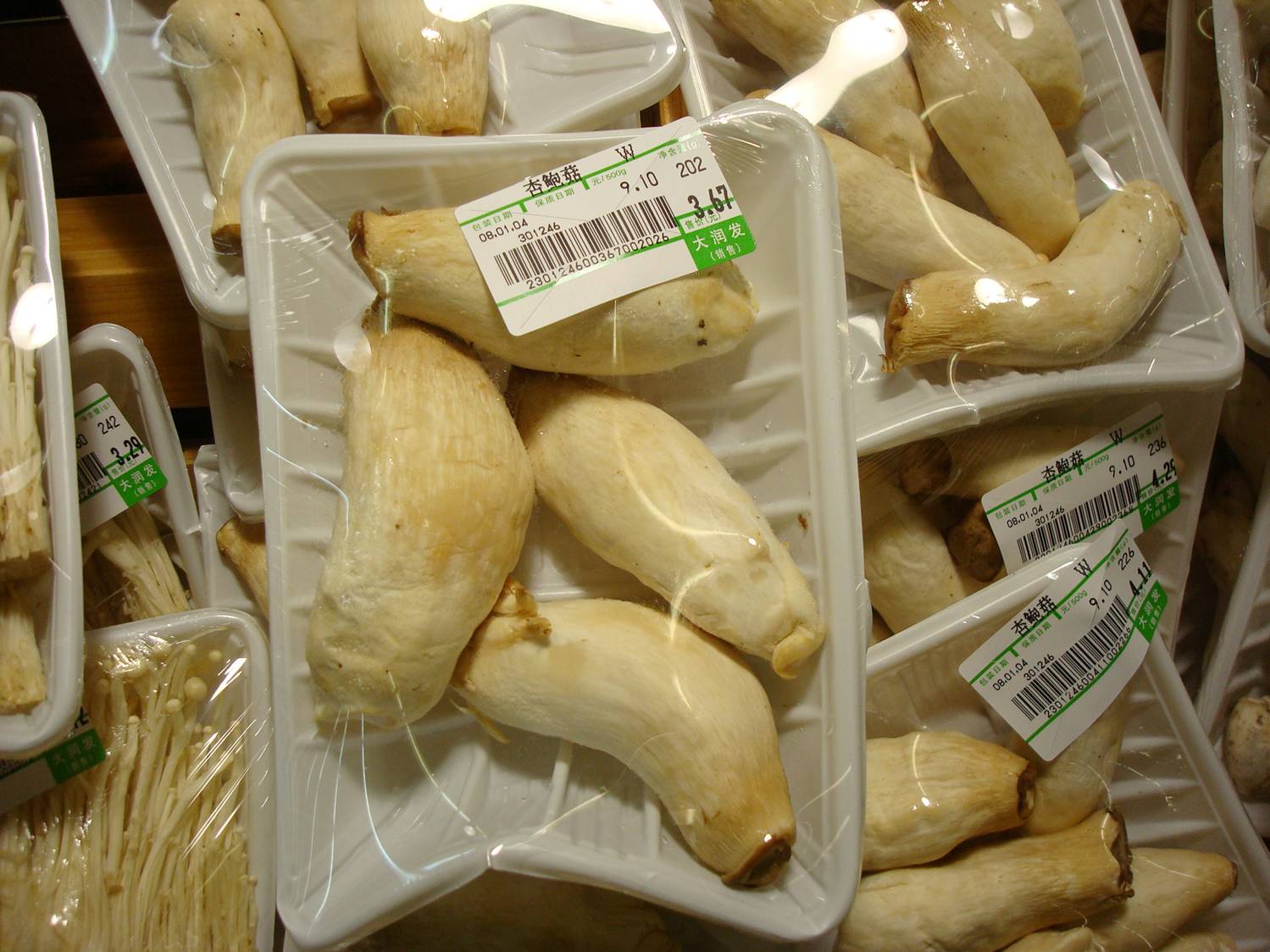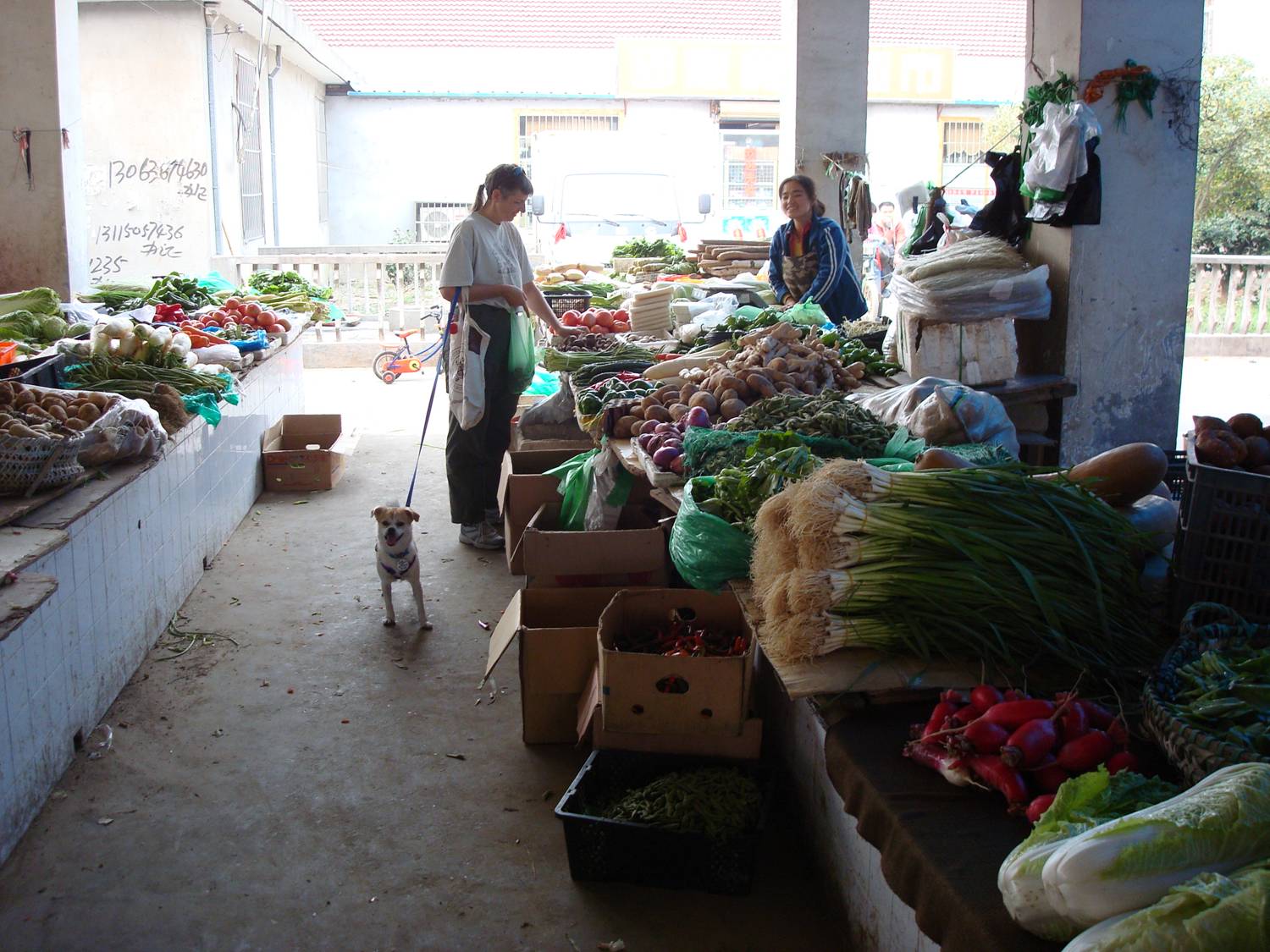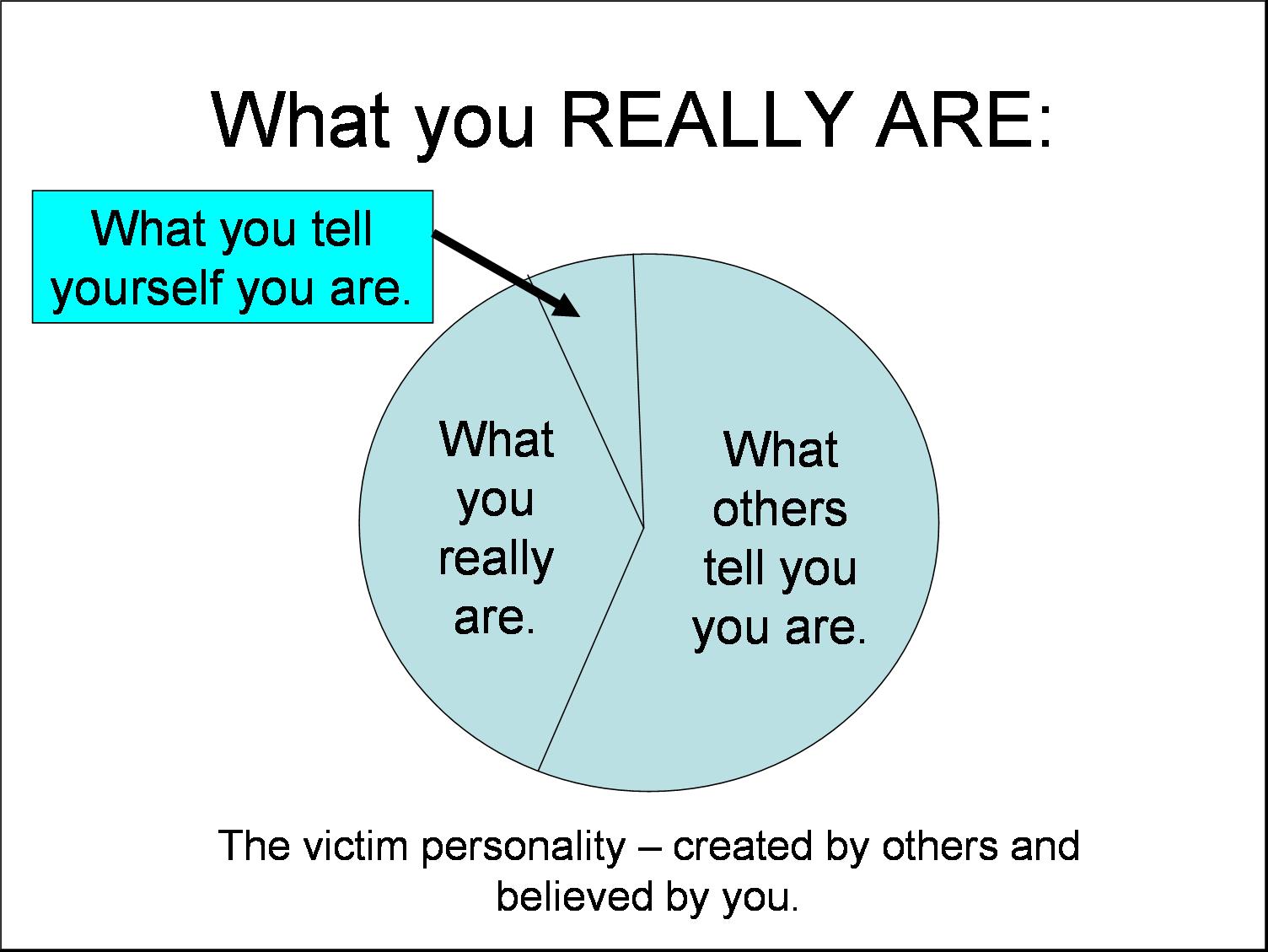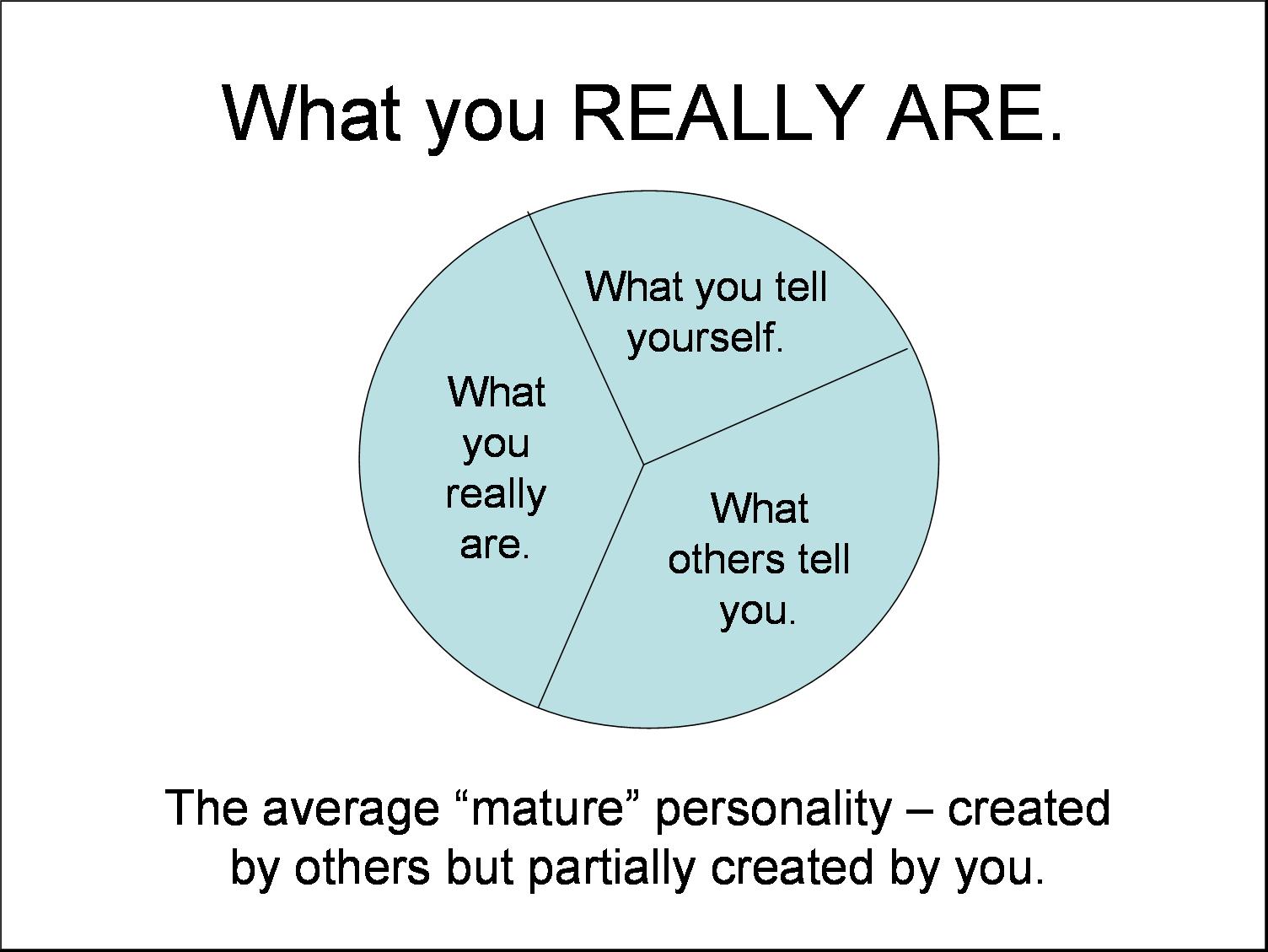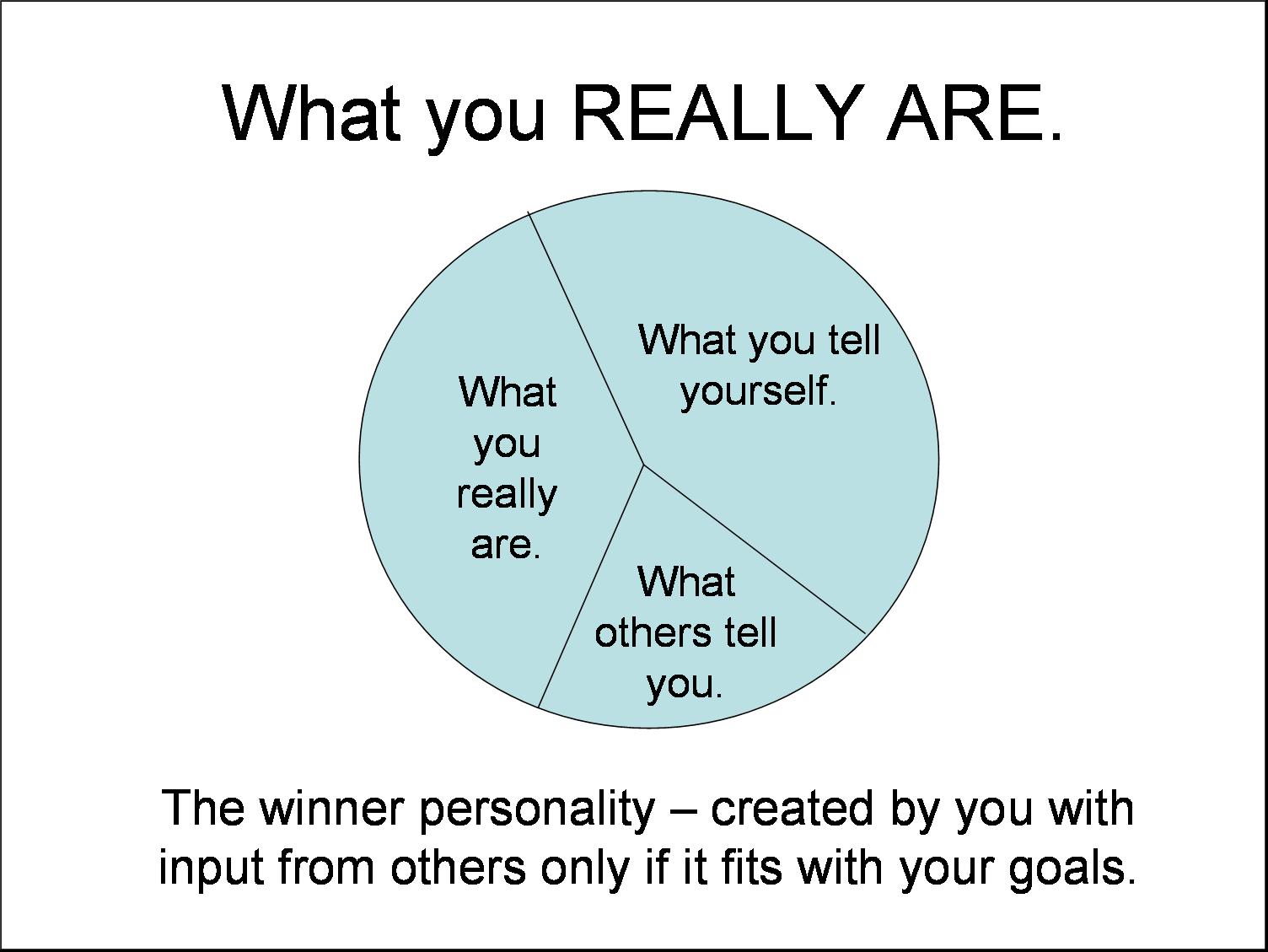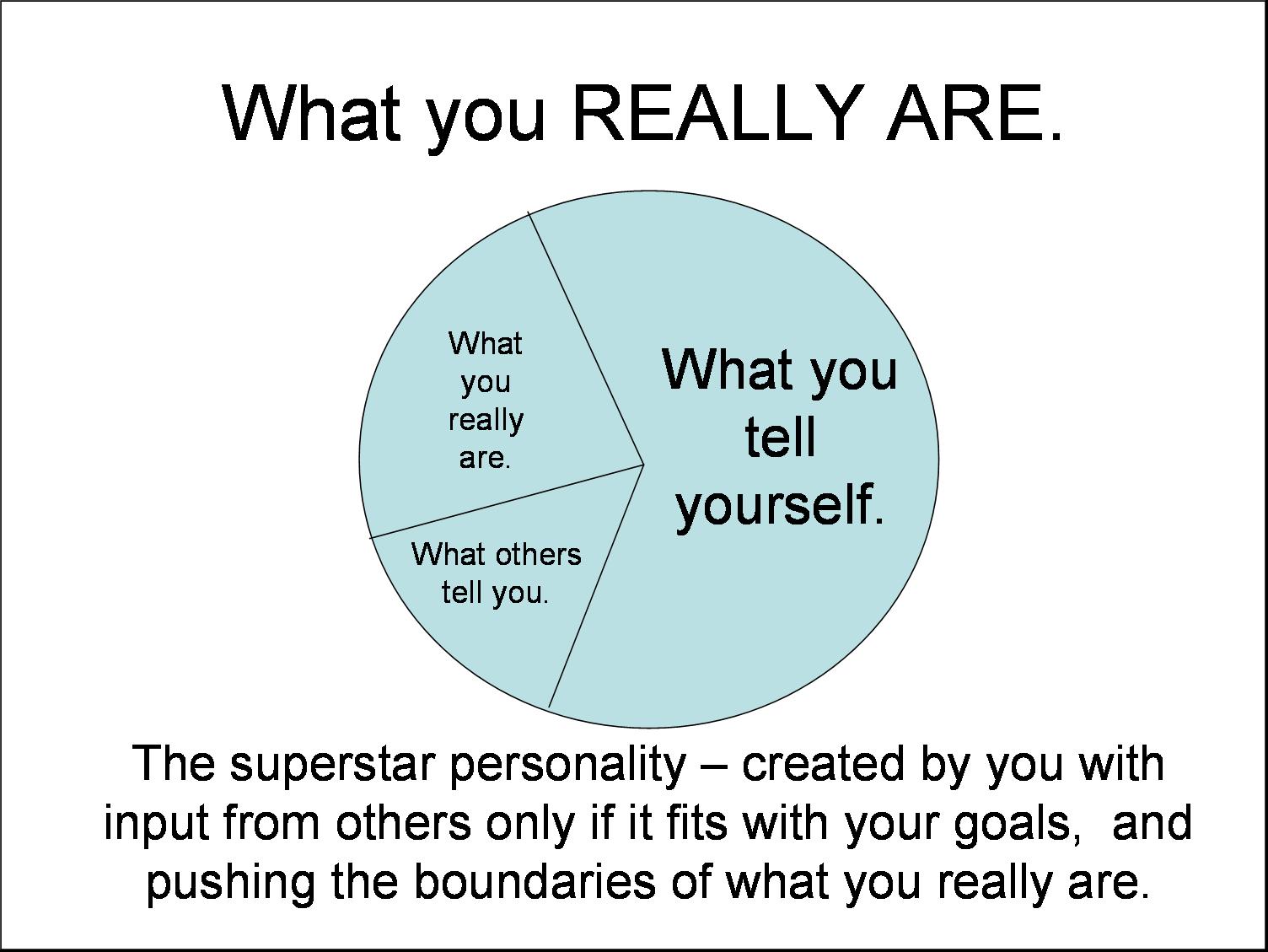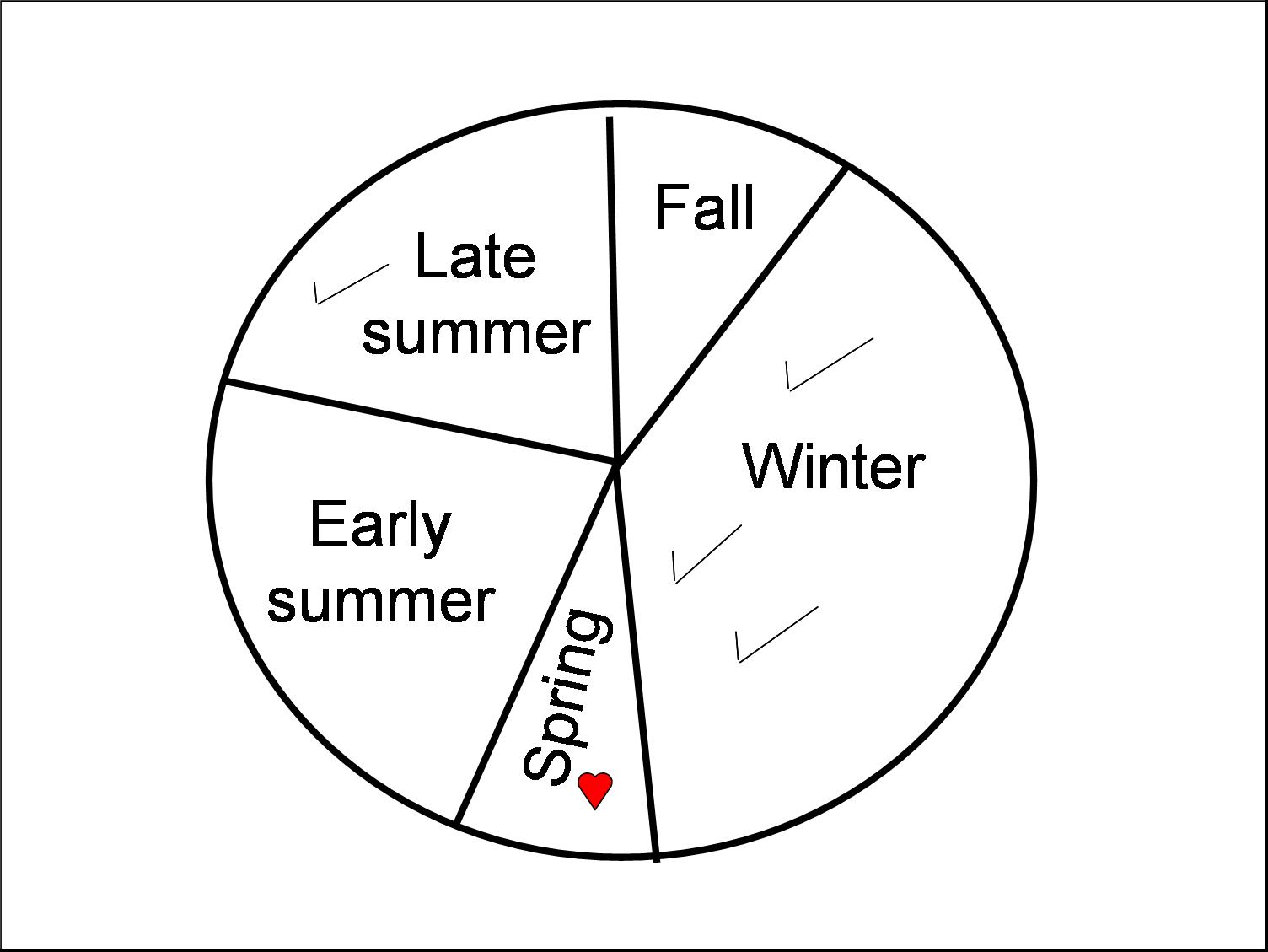|
The Chinese Love Affair with Mushrooms (originally posted January 4, 2008) We've been seeing expanded mushroom areas in western supermarkets lately - with oyster mushrooms, chanterelles, or the big brown and meaty Portobello. But I've never seen a mushroom section in a western market with the variety I find here. I don't have names for most of these.
The shoppers in
the picture above are considering some dried mushrooms. There's another
whole wall with bags of the dried fungus, in varieties I can't identify
given their shriveled state. The ones in the center of the bottom row
are firm and solid, almost like meat. I've come to call the mushrooms in
the right of the bottom row "flavour bombs" because they are hollow and if
boiled in a soup release an amazing burst of flavour when bitten. Each
mushroom has it's own subtle flavour and texture.
There are several such outlets in Wuxi, where we shopped to the sound of All I want for Christmas is my Two Front Teeth and Jingle Bells during the holiday season. If you are worried that China might be too strange and exotic for you, this should ease your mind. You can get along here without a word of Chinese. 没问题 (méi wèntí - no problem).
So Wuxi has everything you might want to live a western lifestyle.
We noticed a new Carrefour, the French shopping center franchise, with
30,000 square meters of floor space, going in a few blocks from RT Mart.
So even more variety will soon be available.
It's as "old China" as you could want, with geese and ducks standing in a pen waiting for their turn to go into the cooking pot. You don't need to speak Chinese to get by here either. The sellers know what you are there for, and will hold up a calculator to show you what you owe.
Leapin' Lizards (originally posted June 2, 2008) Riding back from class this morning I saw three people staring at the ground by a bush. Naturally I had to see what they were staring at. I caught just a flash of the creature as it made off, but one of the people had captured it on his digital camera. He sent me this picture.
He called this little lizard a 变色龙 biàn sè lóng which literally translates to "change colour dragon". My dictionary calls it a chameleon. I didn't know we had them here, and I'm delighted to find out we do. Great racing stripe. Why So Many Comics Are Inspired by Pets: (originally posted November 27, 2008) Not hard to see why this happens. You can't really look at an animal every day without wondering what it is thinking, or putting words in its mouth.
GouGou loves her towel. She will play tug-o-war with it far beyond boredom limit. October 18, 2008 Feedback that Gruntles Excessively For me, a day cannot begin better than by getting an email like this one from Amelia, who sent her reaction to my Oral English class this past week:
It's a beautiful day in Wuxi. The weather is still warm enough to be out without a jacket, but the humidity is lower now so it's very comfortable. The campus is beautiful. It's a weekend. How can life be tough? By the way, my
spell checker is screaming about my use of the word "gruntles" in this
entry heading. Well "gruntles"is still a legitimate word, though a
trifle archaic, one of those words which now is only used in the negative
- disgruntled, like the word "ruth", which means compassion, now only
used in the negative form as "ruthless", a condition to which I do not
want to return. Also, by the way, one of the things I enjoyed about watching my children learn to speak was their amazing creativity with the language. My son Victor invented some brilliant words - "hand lockers" for handcuffs, "not-come-off-knots" for the knot he used on his shoe laces. I really love it when my students use words like "fearness", and I find it difficult to correct them in the interests of prescriptive grammar. The whole point is to communicate, and Amelia does that very well. As 'twas said in "Educating Rita", "assonance" is getting the rhyme wrong. We'll accept and admire it from a poet, but we want to beat these Chinese students into conformity. (Interesting. My spell checker does not balk at the word "assonance".) And now I'm reminded of Milano Zorkin, the late owner of Zorkin Realty in Nanaimo. He spoke with a heavy middle-European accent, and wrote the same way. When his secretary corrected his letters, he made her put them back the way he had written them. Now there was a man who wasn't afraid to speak in his own voice. We should all be so brave. October 16, 2008 The Best Week of Classes Ever Emily's letter lamenting her shyness and my response to it inspired my best week of classes since I came to China. The week didn't start out all that great. My first class, with my International Business students who must prepare for the IELTS test that will let them go overseas, began well enough. But soon I was losing my temper with a few passive aggressive students who either didn't get that you can't learn to speak English without speaking English or who simply don't care about passing the IELTS and going to England. I don't like losing my temper. It's not helpful.
My International Business class. I like these kids, but they do make me work too hard. My first oral class, I asked the students if any of them were shy. No hands went up. Now I know that most of my students would call themselves shy, so the fact that no hands went up called for a lecture on participation. Again I was expressing more anger than is helpful."I've come 15,000 miles, that's 24,000 gongli (kilometers), to help you with your English. If you don't PARTICIPATE, I might as well have stayed home, and you might as well have stayed in bed this morning." After that lecture, I asked the question again and got a few hands up. It was in the next class that I refined this with a pre-emptive strike. The students came in to find the word PARTICIPATE on the board in both English and Chinese (参加 cānjiā). I told them about losing my temper with the last class, and why. I told them why participation is important if they want to get anything out of the class. Then I asked if anybody in the class would call themselves a shy person. A few hands went up. That lead into a lecture about emotional needs. We do everything because of our emotional needs. Every decision we make is because of an emotion. In fact, a person with brain damage that prevents them from feeling any emotion, can't make any decisions at all. So if they are calling themselves "shy", then being shy must be giving them something emotionally. What is it? I suggested that they might have a need to feel safe. A need to be hidden and private. A need to avoid criticism. And I ask them whether satisfying this need is helping them learn English. I told them
that they might find this hard to believe, but I was once shy myself. I
too needed to feel safe and to hide. But I also have a great need for
recognition and attention, and that was in conflict with my need to be
safely hidden. So I started to push myself. And the more I pushed
myself, the easier it was to stand in front of a group of people and do
whatever needed to be done.
That lead into the next subject - what we are? It's my belief that we are a combination of what we've been told we are, what we've told ourselves we are, and what we really are. All three of these are unknowable, because we haven't paid attention to what we have been told, or to what we've told ourselves, and what we really are is largely untested. When I was a child in school, well meaning adults were constantly telling me that I was lazy. My teachers sent home report cards that said I was lazy. My mother would read the report cards and tell me that I was lazy. Well, what happens when you tell a child that he is lazy? If the child believes you, he acts like a lazy person. And that's what I did.
As an adult I one
day realized that I am not lazy. In fact, I'm one of the most energetic
and active people I know. Why were they telling me I was lazy when it was
so obviously not true? The problem wasn't that I was lazy. The problem
was that my teachers were boring. They didn't want to talk to me about
anything interesting. I'd be going into the adult section of the library
to take out books on hypnotism, or natural history, or magic. They
wanted me to learn skills like spelling, which came to me quite naturally
as I read and wrote more, and was finally made irrelevant by spell
checkers.
And all of this leads into a lecture about the subconscious mind, which runs 99.9% of all our functions, including our emotions. I talked about how the subconscious is really smart, and can do things like play the piano with no conscious mind directing the fingers (once you have practiced enough), but also really stupid. The subconscious mind will believe anything you tell it. And if you are telling your subconscious mind something that will prevent you from getting what you want, your subconscious mind will make sure you never get it.
The winner personality takes limited input from others, and the superstar personality even pushes the boundaries of what he or she really is.
My students all want to be winners, if not superstars. Success is very big in China.
Of course this is all just an amalgam of personal development course material and pop psychology, Tony Robins meets Dale Carnegie. But then the class started to be fun. I asked the students who said they were shy if any of them wanted to stop being shy. A couple hesitantly put up their hands. I brought those students up to the front and got them to walk like a chicken. Walk like a duck. Bark like a dog. Crow like a rooster. They were having a great time by this point. The whole class was energized and clapping for them. I asked them how they felt, and they said they felt really good. I told them I was very proud of them, and gave them a Canada pin as a reward for their courage. The next breakthrough for me was getting the students up and moving. I put a pie chart of the seasons on the board and told them to think about which season they like best, then told about seeing this demonstration at a Sophia Society seminar and thinking it was a pointless and dumb exercise - "Of course everybody will put their mark in the same season. There is only one season that is the best, and it's so obviously the best that nobody will choose any other season."
"I'm a smart
person. I've thought about this, and decided what the best season is.
Of course, everybody is going to think the same as I do, and choose the
same season. Right? If they don't, well they're just wrong. Right?
I handed out three pieces of chalk, and told the students to put a mark in their favourite season and then pass the chalk on to somebody else. So now what had been a boring, static class of students sitting at desks looking half interested suddenly transformed into an active and lively scene. Much laughter as students started to get creative with the marks they put on the chart, starting with a heart instead of a check mark and progressing to Chinese characters. By the time I had all the marks on the board, the students were more than ready to stand up and tell the class why their favourite season is the best. Like the Sophia Society group, the marks were all over the chart, with only two in Spring, a few in Summer, and an amazing number in Winter. I was very surprised to learn that the majority of my students think Winter is the best season of all. This in a country where classrooms are all unheated. There was still time for more with this class. We got into arranging lists in order of favourites, with the students in groups trying to reach consensus on their order. But this first part was the best. Just a great class. Now what on earth am I going to do next week? How can I ever top this? I'll think of something. October 12, 2008 an Email from Emily My student, Emily sent me an email this morning, with a question that I think a lot of my students are asking. I hope they will all read my answer and take it to heart.
How Long Before I Have a Right to Be Here? I think this is a question all foreigners must ask themselves sooner or later. How long do I have to be in China before I feel I have a right to the air I'm breathing? How long before I can push back when somebody in a lineup pushes ahead of me? How long before I can call a rule stupid, and argue with the guards at the gate about letting my taxi take me to my door? I'm now, unbelievably, in my fifth year in China. And I'm naturally a fairly assertive person. (Okay, I can hear my friends and relatives back home saying, "Ya think?" Laugh it up, folks.) In China I've been trying to recognize that this isn't my country, and I have no right to tell people here how to behave. But when twelve students finish their dinner, order beer, and all light up cigarettes at the next table in a tiny restaurant, I'm beginning to politely protest. When somebody pushes ahead of me in a lineup, I've been known to pull them back by their jacket collar, to the seeming approval of others in the line who are too politely Chinese to take action themselves. The other evening in Nantong, Ruth and I were walking with a friend on the sidewalk when a young man on a scooter came up behind us and beeped his horn repeatedly in an annoyed manner to make us get out of his way. We turned on him and pointed out that we were on the sidewalk, and there was a perfectly useable road right beside us, so he was welcome to get off the sidewalk and use the road. Which he sheepishly did. As for the guards at the gate, whether I shout at them or not seems to correlate to how much whisky I had after dinner. And that is not a good way to make social decisions in a foreign country. I'm trying to find the balance.
|


